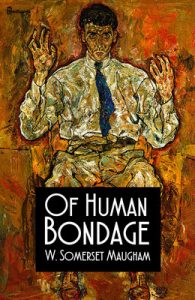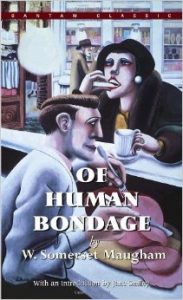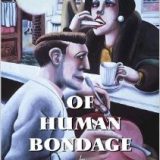Of Human Bondage – William Somerset Maugham – 1915
Reviewed by Jason Tomes, on 29 July 2007
 Perhaps the first thing to be said about this novel (to those entirely unacquainted with it) is that it isn’t as grim as its title might suggest. Its subject is neither the institution of slavery nor the practice of tying people up. Over 122 chapters (700 pages), “Of Human Bondage” depicts chronologically some twenty years in the life of Philip Carey, a middle-class English male, starting with his being orphaned at the age of nine in 1885 and examining his relations with his family (such as it is), his education, his friendships, his women, and his work. Above all, it considers how his experiences mould his attitude to life. It is a big, wide-ranging book of earnest intent, yet also very personal. Though written in the third person, its point of view is overwhelmingly that of Philip himself (to a degree that makes the occasional brief departures from him seem odd). It gets under his skin and delves deeply into his mind. Reaction to “Of Human Bondage” is also likely to be very personal, dependent on the reader’s own experiences and attitude to life. This review makes no claims to objectivity.
Perhaps the first thing to be said about this novel (to those entirely unacquainted with it) is that it isn’t as grim as its title might suggest. Its subject is neither the institution of slavery nor the practice of tying people up. Over 122 chapters (700 pages), “Of Human Bondage” depicts chronologically some twenty years in the life of Philip Carey, a middle-class English male, starting with his being orphaned at the age of nine in 1885 and examining his relations with his family (such as it is), his education, his friendships, his women, and his work. Above all, it considers how his experiences mould his attitude to life. It is a big, wide-ranging book of earnest intent, yet also very personal. Though written in the third person, its point of view is overwhelmingly that of Philip himself (to a degree that makes the occasional brief departures from him seem odd). It gets under his skin and delves deeply into his mind. Reaction to “Of Human Bondage” is also likely to be very personal, dependent on the reader’s own experiences and attitude to life. This review makes no claims to objectivity.
That said, I don’t think many would dispute the readability of Maugham’s prose, which is so clear and unmannered as to seem almost timeless. The structure of the novel may be rather loose, but it does flow, and I found no difficulty in turning the pages. On the other hand, I did find myself wondering at the end whether it would not be a better book if it were shorter. The thought even crosses my mind that I could perhaps have done without the whole first half.
Since finishing “Of Human Bondage”, I have learnt that it is semi-autobiographical. This may make one of my chief reservations about it sound misplaced. In this realist novel, I do not find some of the characters and situations quite realistic enough to be altogether convincing. Uncle William, the selfish vicar; Hayward, the dilettante; Lawson, the art student; Cronshaw, the decadent poet; Athelny, the idiosyncratic ‘journalist’ (really, an advertising copywriter) – these men appear to me more like literary types than genuine individuals from the real world. In turning people whom he knew into fiction, perhaps Maugham fictionalised them just that bit too much. In particular, the whole Athelny family strikes me as virtually Dickensian in its artificiality (think: ‘they were poor, but they were happy,’ etc.). The treatment of Philip’s schooldays and his two years as an art student in Paris is likewise too obviously novelistic for my taste; I somehow felt that I had read it all before elsewhere.
Far more original is the coverage of the adult Philip’s relationship with the ghastly Mildred Rogers. I suspect that this strand of the novel is what makes “Of Human Bondage” memorable to most of its readers, even though she does not make her first appearance until page 306. Philip consistently finds Mildred ‘heartless, vicious and vulgar, stupid and grasping’ – and he loves her madly. We enter the realms of psychological masochism here, and the extent to which the reader can make any sense of Philip’s devotion to Mildred will probably depend on his or her own personality. I had supposed that physical attraction would explain why a man might pursue a woman whose character he loathed and despised. Such apparently need not be the case, as we are repeatedly reminded that Philip finds Mildred’s flat breast and narrow hips repellent. She treats him with indifference at best; he bends over backwards to please her, even facilitating her liaisons with another man, while himself tortured by jealousy. It is not as if she were his only option: he deliberately casts aside Norah, ‘worth ten of Mildred’. Philip’s conscious self-abasement is strange and interesting.

Also interesting at times is Philip’s continual quest for a moral philosophy. He abandons Christianity, fails to be satisfied by aestheticism, and acquires something of an existentialist outlook. Among all his many and varied intelligent reflections on life, every reader is likely to find at least a few that will please him and make him think, “Yes, that’s spot on!” (though convinced Christians will not greatly appreciate the general drift of his views). The book is largely a study of a young person’s coming to terms with reality. The passage that leapt out at me as suggesting its general tenor is in Chapter 29:
‘It is an illusion that youth is happy, an illusion of those who have lost it; but the young know they are wretched, for they are full of the truthless ideals which have been instilled into them, and each time they come in contact with the real they are bruised and wounded. It looks as if they were victims of a conspiracy; for the books they read, ideal by the necessity of selection, and the conversation of their elders, who look back upon the past through a rosy haze of forgetfulness, prepare them for an unreal life. They must discover for themselves that all they have read and all they have been told are lies, lies, lies…’
This reader finds it hard to believe that the circumstances of the superficially happy ending of the novel would keep Philip Carey contented for very long.
“Of Human Bondage” is a sincere and serious book at bottom, though marred by intermittent lapses into ‘fictionalism’ (by which I mean slightly stereotyped characters and transparent literary devices). I read that Maugham considered his place in literature to be ‘in the very first row of second raters’. On the evidence of this novel, I think he may well have been correct.















